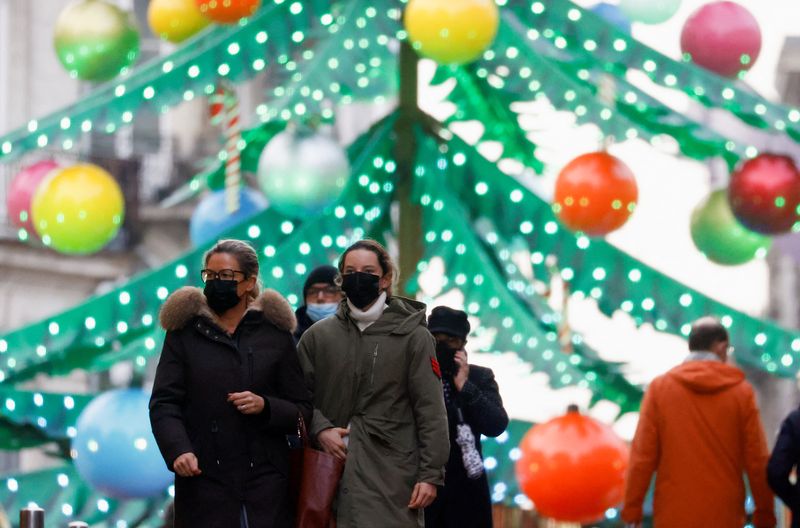By Dominique Vidalon and Aislinn Laing
PARIS (Reuters) - France imposed travel restrictions on travellers from Britain on Thursday due to surging COVID-19 cases there, and several European countries also strengthened border controls on visitors from other EU states.
Plans for Christmas celebrations in Europe and many countries across the globe have been thrown into disarray by the rapid spread of the highly infectious Omicron variant, which emerged in Hong Kong and Southern Africa last month.
Britain on Wednesday recorded its highest number of daily coronavirus cases since the start of the pandemic. That prompted the French government to announce on Thursday that only certain categories of travellers, including truck drivers, would be allowed between the two countries. Anyone arriving from Britain would have to self-isolate.
"Our goal is to limit as much as possible the spread of Omicron across our territory," French government spokesman Gabriel Attal said. "Tourism and business travel for people who are not French nationals or Europeans, people who are not French residents, will be limited."
British hospitals were struggling to maintain staffing levels due to people having to isolate with COVID-19, a senior medic told Reuters. The 95-year-old Queen Elizabeth canceled a pre-Christmas lunch with her family as a precaution.
Sweden said it would require visitors from other Nordic nations to have a vaccine pass amid a jump in new infections in recent days.
Across the globe in Asia, South Korea said spiraling infections meant it too would reinstate strict rules constraining gatherings and closing restaurants, cafes and bars early.
The new wave of infections and the return to tighter restrictions comes just weeks before the second anniversary of the emergence of the coronavirus in Wuhan, China. Since then more than 5 million people have died of COVID-19 globally and more than 272 million cases have been reported.
Meanwhile, more than 8.5 billion doses of the COVID-19 vaccine have been administered to combat the disease - an effort that is now challenged by the Omicron variant's outburst.
ROUND THE BLOCK
At a summit of EU leaders in Brussels, tensions arose after Italy, Portugal and Greece said they would require people crossing their borders to have a negative COVID-19 test as well as a vaccine passport.
Latvian Prime Minister Krisjanis Karins said freedom of travel inside the EU's border-free Schengen Area must not end.
Around Europe, vaccination booster campaigns and the administration of first doses to children aged 5 to 11 generated long queues that snaked around city blocks as hospitals, pharmacies and clinics struggled to cope with demand.
Preliminary data show vaccines are less effective against Omicron, but a booster increases protection.
England's chief medical officer Chris Whitty said vaccinations could cut the numbers admitted to intensive care and shorten the time spent in hospital.
Travel operators and retailers said the tightening of COVID regulations would hit them hard in the run-up to Christmas.
Officials at the port of Dover (NYSE:DOV) on the British side of the Channel said France's new travel curbs would dampen already significantly reduced tourist numbers.
British online fashion retailer Boohoo issued its second profit warning in four months, citing factors including a rise in partywear return rates amid canceled Christmas parties.
Weekendesk, a Spanish holiday website, said cancellations jumped 19% from the previous week and blamed a new requirement for vaccine passports in Catalonia, Valencia and Andalucia.
SPORTING LIFE
The impact was also being felt across the world of sport, from international and elite level down to grassroots.
Hundreds of amateur clubs in Britain across a range of sports have cancelled weekend fixtures and closed clubhouses, despite there being no government advice to do so.

A fourth Premier League match of the week was cancelled on Thursday after Brentford manager Thomas Frank called for all games in the coming week to be postponed to allow clubs to recover their depleted squads.
The Swedish national soccer team cancelled a planned friendly against Finland, while teams and leagues in the three major North American sports were trying to avoid cancellations after a massive outbreak of positive tests among players.